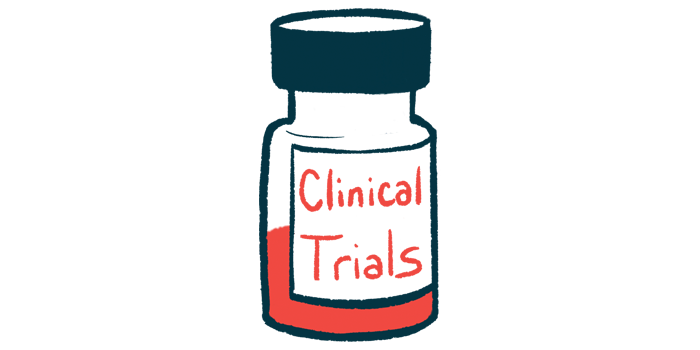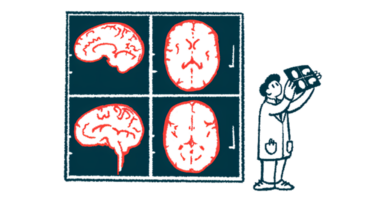Low-dose fosgonimeton boosts cognition in dementia patients: Trial
Small molecule also being tested in Phase 2/3 LIFT-AD trial for Alzheimer's

Low-dose fosgonimeton (ATH-1017), an investigational small molecule, may have cognitive benefits for people with Parkinson’s disease-related dementia or dementia with Lewy bodies, according to recent data from a clinical trial.
The small exploratory Phase 2 study, called SHAPE (NCT04831281), tested the safety and efficacy of fosgonimeton given once daily via subcutaneous (under-the-skin) injections for about six months at either a low (40 mg) or high (70 mg) dose, versus a placebo.
The trial was planning to enroll 75 people, ages 40 to 85, with Parkinson’s or dementia with Lewy bodies, but it was capped at 28 participants. The trial did not meet its main goal, defined as the combined score in changes in brain activity (assessed by ERP P300 latency) and cognitive function (assessed by ADAS-Cog13).
ERP P300 latency is a way to measure how quickly the brain responds to something. The ADAS-Cog13 is a tool used to measure and evaluate various aspects of cognitive function in individuals, where scores range from zero (least impairment) to 85 (most severe impairment).
“The findings from the cognitive measures in the SHAPE trial add to the data we have generated from preclinical models of dementia,” said Kevin Church, PhD, chief scientific officer of Athira Pharma, fosgonimeton’s developer, in a company press release.
Dementia with Lewy bodies caused by alpha-synuclein protein clumps
Like Parkinson’s, dementia with Lewy bodies is caused by abnormal clumps of the alpha-synuclein protein, which are toxic to neurons (nerve cells), resulting in a range of motor and nonmotor symptoms, including cognitive impairment.
Fosgonimeton is a brain-penetrant small molecule designed to activate signaling via the hepatocyte growth factor (HGF), a protein that helps neurons survive and form new connections with other neurons, improving memory and learning. By activating this pathway, fosgonimeton is thought to offer neuroprotective effects and improve brain health and function.
Preclinical work in nerve cells has shown that fosgonimeton increased these cells’ survival in the presence of neurotoxic insults, and reduced the buildup of alpha-synuclein. In a rat model of Parkinson’s, it was found to improve motor function and coordination.
For Hans Moebius, MD, PhD, chief medical officer of Athira, “these findings support the potential of targeting HGF system positive modulation as a broadly applicable strategy for treating neurodegenerative diseases.”
In the SHAPE trial, each of the five patients in the intent-to-treat group who received fosgonimeton at 40 mg showed an improvement in ADAS-Cog13.
At 26 weeks, patients on 40 mg of fosgonimeton had a significant reduction of 7.2 points in ADAS-Cog13 compared with a placebo, suggesting fosgonimeton may have cognitive benefits for people with Parkinson’s-related dementia or dementia with Lewy bodies.
“In this small exploratory trial, once daily treatment with fosgonimeton 40 mg showed positive effects in cognitive measures compared to placebo, with an observed statistically significant difference in ADAS-Cog13,” Moebius said.
Patients on this dose also showed improvements in other cognitive, functional, and biomarker measurements. Results for patients on the 70 mg dose were inconsistent, perhaps due to a higher dropout rate of 50%.
No serious side effects of fosgonimeton reported
Fosgonimeton was well tolerated at 40 mg and 70 mg doses. The most common side effect was a reaction at the site of injection. There were no reported serious side effects or deaths related to treatment.
Athira plans to present these findings at an upcoming medical meeting.
The data also support LIFT-AD (NCT04488419), a Phase 2/3 clinical trial of fosgonimeton in Alzheimer’s disease, the most common form of dementia. LIFT-AD remains on track to complete enrollment in early 2024, with topline results expected in the second half of 2024.
“These encouraging findings from the SHAPE trial further bolster our confidence in the ongoing Phase 2/3 LIFT-AD trial of fosgonimeton as a potential treatment for Alzheimer’s disease,” said Mark Litton, PhD, president and CEO of Athira.
The data “support our May 2023 amendment to the LIFT-AD protocol to pursue the 40 mg dose versus placebo and discontinue the 70 mg dose,” Litton added.








